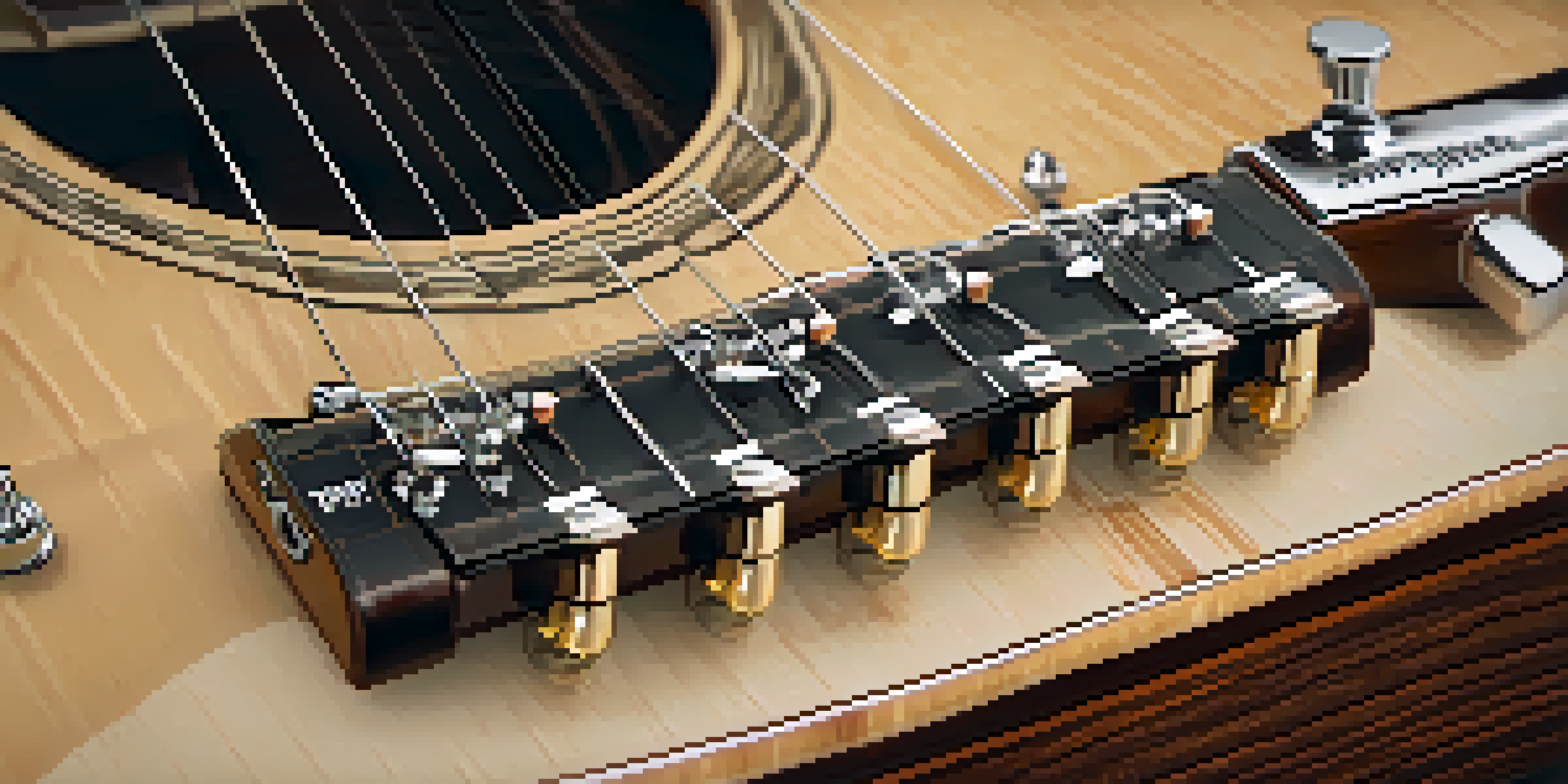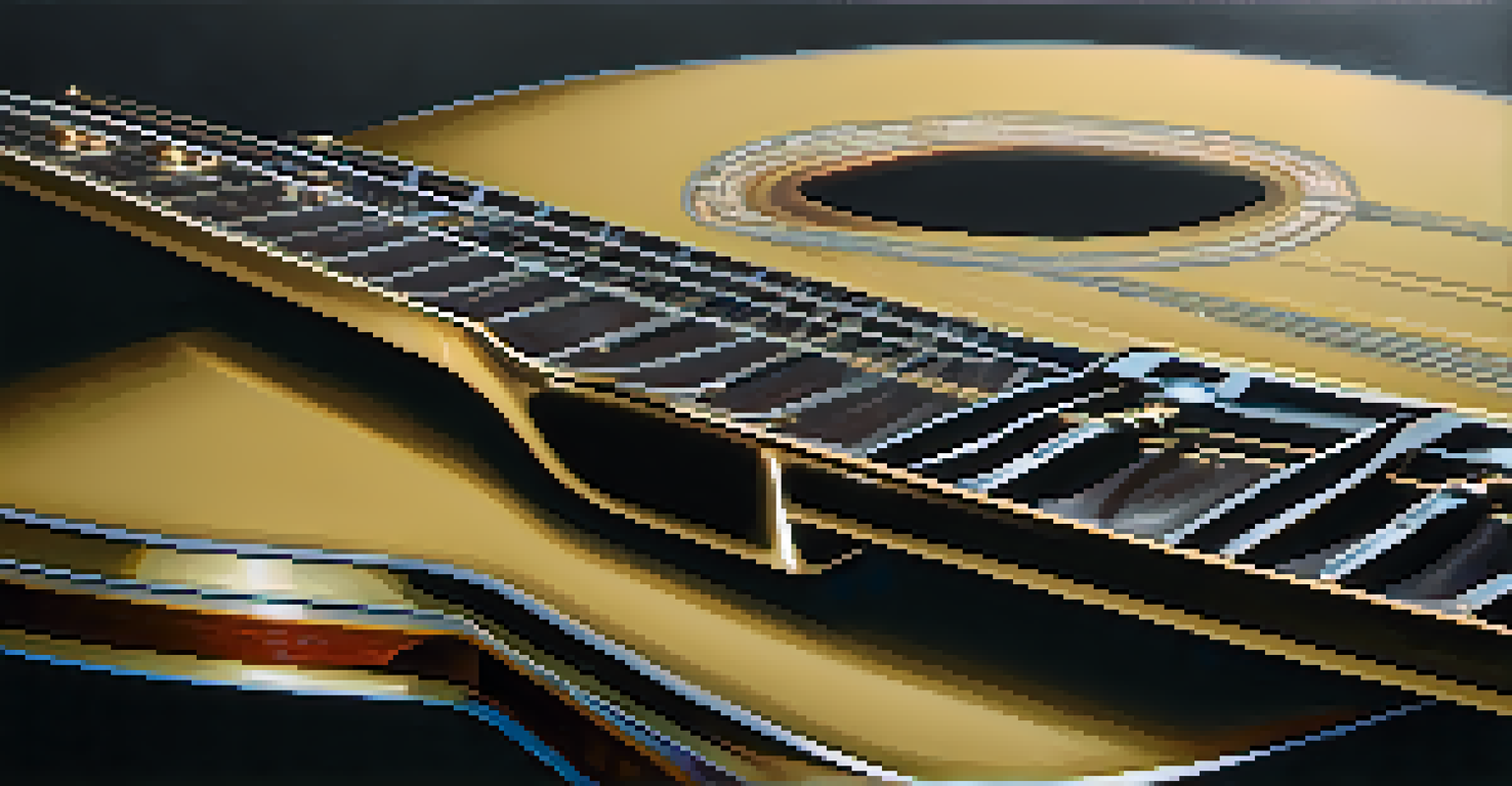Upgrading Guitar Hardware: Tuners, Bridges, and More

Understanding the Importance of Guitar Hardware Upgrades
Upgrading your guitar hardware can significantly enhance your instrument's performance. Think of it like tuning up a car; the right upgrades can transform a standard vehicle into a high-performance machine. Similarly, new hardware can improve tuning stability, sustain, and overall playability.
The sound of a guitar is not just in the strings or the body; it's in the hardware that connects them.
Many guitarists often overlook hardware upgrades, focusing more on pedals and amps. However, the quality of your tuners, bridge, and other components can directly affect your sound and how easily you can play. It's like having a great amp but playing through a rusty cable; the connection matters.
Ultimately, investing in quality hardware can lead to a more enjoyable playing experience. Whether you're a beginner or a seasoned pro, understanding the importance of these upgrades can inspire you to explore new sonic possibilities.
Choosing the Right Tuners for Your Guitar
Tuners play a crucial role in maintaining your guitar's tuning stability. Upgrading to quality tuners can make a noticeable difference, especially if you perform regularly or play in varying climates. Imagine trying to play a gig where your guitar won’t stay in tune; it’s frustrating and can ruin a performance.

When selecting tuners, consider factors such as gear ratio and material. A higher gear ratio often results in finer tuning adjustments, while materials like locking tuners can provide extra stability. Just like choosing the right shoes for a long hike, the right tuners can make your playing experience much smoother.
Upgrade Hardware for Better Sound
Investing in quality guitar hardware can significantly enhance your instrument's performance and overall playability.
Additionally, you might want to consider the aesthetics of your tuners. They come in various styles, colors, and finishes, allowing you to customize your guitar's look while enhancing its functionality. Finding the right balance between style and performance can lead to a more satisfying setup.
The Impact of Bridge Upgrades on Tone and Sustain
The bridge of your guitar is where the strings meet the body, making it a critical component for sound quality. Upgrading your bridge can lead to improved sustain and resonance, which can elevate your overall tone. It’s like changing the foundation of a house; a solid base can support everything built on top of it.
Invest in your instrument, and it will reward you with a lifetime of music.
Consider materials when exploring bridge options. Brass or titanium bridges can provide different tonal qualities compared to standard zinc, affecting the brightness or warmth of your sound. Imagine playing an acoustic piece where the richness of the notes is enhanced by a better bridge; it's truly transformative.
Moreover, the type of bridge can also influence playability. For instance, a tremolo bridge allows for expressive bends and dives, perfect for genres like rock or blues. Upgrading your bridge not only enhances tone but can also inspire new playing techniques and styles.
Exploring Nut Upgrades for Better Tuning Stability
The nut is another often-overlooked component that can affect tuning stability and string action. Upgrading to a better nut material, such as bone or graphite, can enhance your guitar's performance, especially when it comes to tuning consistency. Think of the nut as the gatekeeper; if it’s not functioning well, everything behind it can suffer.
A well-cut nut will allow strings to glide smoothly, reducing friction and minimizing tuning issues. This can be particularly beneficial for guitars with tremolo systems, where the strings are subjected to more movement. Picture yourself playing a solo, and your strings remain perfectly in tune as you dive and pull; it’s a game-changer.
Choose Tuners for Stability
Selecting high-quality tuners is crucial for maintaining tuning stability, especially during performances.
Additionally, a new nut can also improve the overall feel of your guitar. Lowering the nut height can make fretting easier, especially for beginners. Upgrading your nut might seem minor, but it can have a significant impact on your playing comfort and sound.
String Selection: Finding the Right Fit for Your Sound
While not strictly hardware, the choice of strings is crucial when upgrading your guitar's components. Different string materials and gauges can alter your guitar's tone and feel, complementing the upgrades you've made. It’s like pairing the right wine with a meal; the right strings can enhance the overall experience.
Consider experimenting with different materials such as nickel, stainless steel, or coated strings. Each type offers a unique tonal quality and lifespan, which can affect how your guitar sounds over time. Just as a chef might adjust seasonings, you can tweak your sound with the right string choice.
Don’t forget about string gauge either! Lighter strings are easier to play but may lack some volume, while heavier strings can provide a fuller tone but might require more finger strength. Finding the right balance can make all the difference in achieving your desired sound and playability.
The Role of Pickups in Your Guitar's Sound Upgrade
Pickups are the heart of your guitar's sound, converting string vibrations into electrical signals. Upgrading your pickups can dramatically change your tone, making them one of the most impactful hardware upgrades you can make. It’s like swapping out the speakers in your sound system; the right pickups can reveal a whole new depth to your music.
When choosing pickups, consider your playing style and genre. Single-coil pickups offer a bright, clear tone perfect for genres like blues and country, while humbuckers provide a thicker, warmer sound, ideal for rock and metal. Think about the sound you want to achieve; the right pickups can help you get there.
Pickups Define Your Tone
Upgrading pickups is one of the most impactful changes you can make to alter your guitar's sound and tone.
Also, pay attention to the installation process. While some pickups can be easily swapped out, others may require soldering or professional help. It’s essential to understand your comfort level with DIY projects before diving in. A well-executed pickup upgrade can be a rewarding experience, offering a fresh perspective on your music.
Maintaining Your Upgraded Hardware for Longevity
Once you've upgraded your guitar hardware, proper maintenance is crucial to ensure longevity and performance. Regular cleaning and inspection can prevent corrosion and wear, keeping your instrument in top shape. Think of it as a relationship; regular care and attention can help it flourish over time.
Be sure to check the tightness of your tuners and bridge regularly. Loose hardware can lead to tuning issues and affect playability. Just like you’d regularly check the air in your car tires, a quick inspection can save you from bigger problems down the road.

Additionally, consider using a quality guitar case or gig bag to protect your instrument from environmental factors. Extreme temperatures and humidity can wreak havoc on your guitar’s hardware. Investing in good protection means your upgrades can shine for years to come.